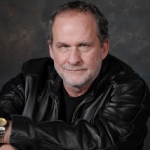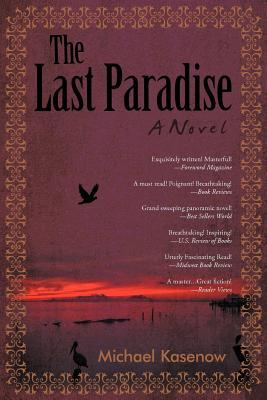Author: Michael Kasenow
Title: The Last Paradise
Publisher: iUniverse
ISBN: 978-1440120015
Pages: 320, Paperback & Hardcover/Kindle
Genre: Historical Novels
Author Interview with Michael Kasenow
 Author Interview Michael Kasenow
Author Interview Michael Kasenow
Title: The Last Paradise
Interviewed by: Suzanne Gattis for Pacific Book Review
Today we have the pleasure of being with Michael Kasenow, author of The Last Paradise released by publisher iUniverse in 2009. Michael, thank you for joining us.
MK: Very nice to be here; thanks for the interest.
PBR: With a background in environmental science, what drew you to write a novel like The Last Paradise?
MK: Even though I’ve written about 14 books on fresh water, I’ve always enjoyed the literary written word. I’ve been honored for my poetry. So it was natural to cross the bridge into writing novels. Environmental science is just one of my interests; fiction is another. The Jim Crow Era was a bad time in our history. Like most people, I’m drawn to the underdog. Those who survived that time had fortitude difficult to comprehend. The characters took me and I followed their journey. Once the book was underway, it was a great adventure discovering that independent culture.
PBR: Why did you choose Galveston as the setting of your novel?
MK: I really had no choice. This disaster occurred in 1900 at the island. Galveston was devastated and never recovered. One-fourth of the city died in that storm and most of it destroyed. So Galveston was the location by virtue of its history. At the time, Galveston was the third richest city in the United States, behind New York and Chicago. Today it’s a unique tourist location, but certainly not the third richest city in the U.S. Like all subjects, the Galveston hurricane grew on me as I gained interest. I delved into the island and discovered many aspects of that disaster that were not well known by many people, including me. It of course contained many personalities both rich and poor. Ex-slaves, ex-cowboys and civil war vets. I was drawn to the poor part of that city and the characters jumped alive in my head. It was nice to take the reader, as well as myself, to this romantic setting. Like New Orleans and Paris, it is a great place to explore. When I write, I want to take the reader to locations where they’ve never been. I’m currently writing a ghost story that occurs in New Brunswick. In January “View from the Edge” will be released, and that takes place inside the workings of the college/university environment. When I take the reader to these places, I take myself, and get lost in the history and culture. It’s rewarding on many levels.
PBR: How long did you research the time period and the location before compiling the book?
MK: A couple of years on and off, when I was ready, it took about six months to write. I grew with the characters, so it was a very enjoyable experience.
PBR: Which character in the book do you most identify with?
MK: Well, Maxwell Hayes; like Maxwell, when I was young, I left a broken home and drifted into various alleyways, experiencing the good, bad and ugly. The characters in “The Last Paradise” are conglomerations of personalities I have met. Those who were also struggling to stay alive. Good people on bad roads in need of a break. They grew from my imagination, but all have an important meaning in their own way.
PBR: Why do you think the readers are drawn to the character Maxwell Hayes?
MK: Maxwell is intriguing in many ways. A tough guy with a gentle heart; a man trying to make amends for a bad past. He’s a loner searching for a purpose. He’s smart enough to be one-step a head of the law; but wise enough to understand what’s important in life. He’s like the big brother we never had. Even though his methods are questionable, he always does the right thing. He’s searching for the America we were all brought up to believe in, and he hasn’t given up on it. The last few lines in the book sum up his journey, when Fanny says, “Maxy, I don’t know what you’re looking for, but it’s probably not out here.” Maxwell smiles and says, “Yea, well. It doesn’t mean we should stop lookin’ for it.” That’s really touching, coming from a man who’s had a hard life.
PBR: Who are some of your favorite authors and which are some of your favorite books?
MK: John Steinbeck for sure, anything he has written. Somerset Maugham, “The Razor’s Edge”, “Of Human Bondage”. I haven’t read a book of his I didn’t like. Joyce Carol Oates, “Black Water” remains in my head. “The Bell Jar” by Sylvia Plath affected me, as well as Fitzgerald’s “The Great Gatsby” and Cormac McCarthy’s “The Road”. I enjoyed Hemingway’s first two novels, especially “A Farewell to Arms”, just a great, great novel. Jack Kerouac, Ken Kesey, Carl Sandburg, Sara Teasdale, Edna Vincent Millay. Anybody who does something interesting with the written word. Anne Rice, “Interview with the Vampire” elevated horror into a respectable literary art form. Her prose is astonishing. The last three plays by Eugene O’Neill, especially “Long Day’s Journey into Night”. “Death of a Salesman” by Arthur Miller; “The Crucible”. And certainly the poet Edwin Arlington Robinson. He won three Pulitzers in the 1920’s and is somewhat fading into history, but was very important for pushing American poetry into the right direction. “Babbitt” by Sinclair Lewis, also a great novel.
PBR: We wish you the best of success with The Last Paradise. Will we see any of these characters again, perhaps in a future novel?
MK: I’ve a story growing in my head about Maxwell Hayes ten years after Galveston; maybe in Alaska or Mexico, or both places. But what I don’t ever want to do is write the same story twice. So this will be down the road, sometime, when Maxwell and I are ready to meet again.
PBR: Thank you once again for spending this time with us.
MK: Thanks for letting me talk about my work. This is enjoyable.



Follow Us